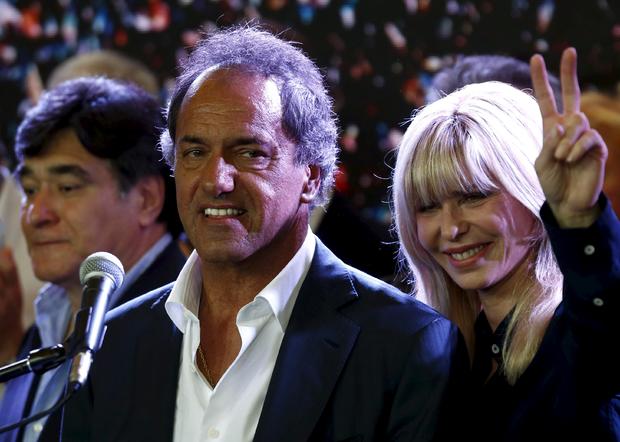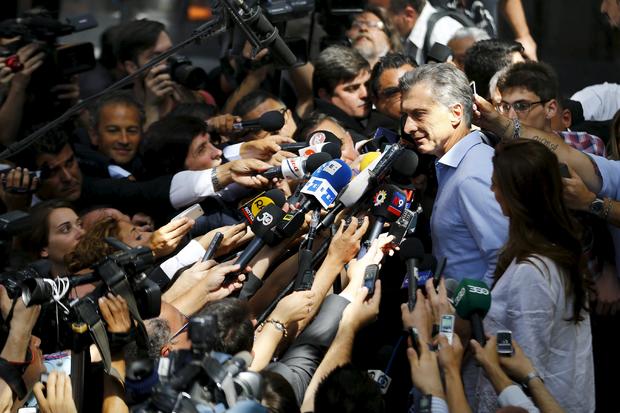Argentine opposition wins historic presidential election
ARGENTINA -- Opposition candidate Mauricio Macri has won Argentina's historic runoff election, putting an end to the era of left-leaning President Cristina Fernandez, who along with her late husband dominated the political scene and rewrote the country's social contract.
Ruling party candidate Daniel Scioli, Fernandez's chosen successor, conceded late Sunday.
He told supporters that he had called Macri to congratulate him.
Macri, the mayor of Buenos Aires, ran on promises to overhaul the South American nation's sagging economy.
His win comes after he did better than expected in the first round on Oct. 25, forcing a runoff with Scioli, the governor of the vast Buenos Aires province.
Macri campaigned on promises to reform and jump-start Argentina's economy, and went into Sunday's race as the front-runner after his unexpectedly strong showing in the first round.
"I'm so happy," said Julia Juarez, a 66-year-old retired teacher who was one of thousands cheering and watching the returns at Macri's bunker. "Argentines are tired of this government. Tired of the corruption. We are ready for something new."
Scioli, who had been expected to win by 10 or more points in last month's six-candidate election, tried to regain momentum by frequently attacking Macri before the runoff. He said a Macri victory would subject this nation of 41 million people to the market-driven policies of the 1990s, a period of deregulation that many Argentines believe set the stage for the financial meltdown of 2001-2002.
While he and close aides expressed confidence early Sunday, nobody from his camp had spoken since the polls closed. Macri supporters were already celebrating.
"We are doing well, very well," said Maria Eugenia Vidal, governor-elect of the Buenos Aires province and a top official in Macri's "Let's Change" coalition.
The power couple spent heavily on programs for the poor, raised tariffs to protect local economies and passed several progressive laws, including the legalization of gay marriage in 2010.
Macri frequently repelled Scioli's claim that Macri represented policies of the past, saying he would lead with "21st century development" as opposed to "21st century socialism" -- a term used by supporters of the late Venezuelan President Hugo Chavez and his successor, Nicolas Maduro.
The election comes at a time when Argentina's economy, Latin America's third largest, has stalled. Inflation is around 30 percent, gross domestic product growth is just above zero and many private economists warn that the Fernandez administration's spending is not sustainable.
Macri has promised to address the economic problems and to shake things up regionally. If elected, he said, he would push to expel Venezuela from the South American trade bloc known as Mercosur because of the jailing of opposition leaders under Maduro. That would be a huge change for a continent where many countries, including neighbors Chile, Brazil and Bolivia, have left-leaning democratic governments that have maintained close ties with Venezuela.
Over the course of the campaign, both candidates at times tried to straddle the center. Scioli said he would solve a long-standing New York court fight with creditors in the U.S. who Fernandez calls "vultures" and has refused to negotiate with. Macri flipped his position and voiced support for the nationalization of the YPF oil company and Aerolineas Argentina, popular actions by the Fernandez administration.
But there were also clear differences.
Macri promised to lift unpopular controls on the buying of U.S. dollars and thus eliminate a booming black market for currency exchange. Doing that would likely lead to a sharp devaluation of the Argentine peso. With low foreign reserves, the government would desperately need an immediate infusion of dollars. Those could come from many different places, but ultimately would require structural changes to a largely protectionist economy, solving the debt spat and developing warmer relations with other nations, including the United States.
Scioli, governor of the large Buenos Aires province, said he would maintain energy and transportation subsidies along with the many social works programs instituted under Fernandez and Kirchner, her late husband and presidential predecessor. While such promises signaled an embrace of the status quo, Scioli also promised to make small fixes where necessary.

